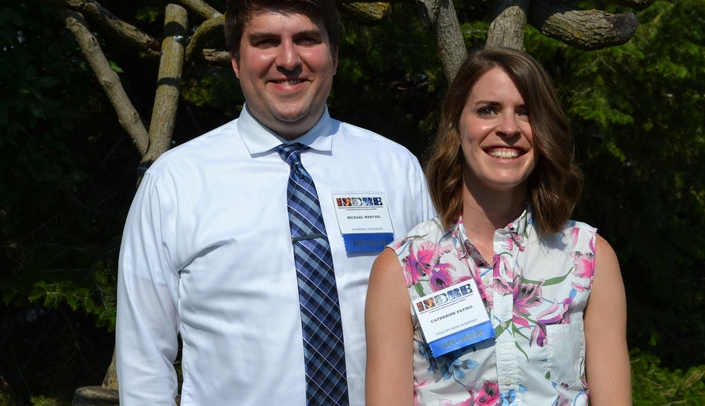Two former NE-INBRE Scholars took to the podium at the 2018 Annual Scientific Meeting and brought different perspectives to what life is like as a research scientist.
For Cady Patino, a research scientist with HTI Labs in Omaha, Neb., (formerly known as the Human Trafficking Initiative) it’s studying data science and applying it to social science research, after acquiring a master’s degree in bio-systems engineering and working at a pharmaceutical company for four years.
And for Michael Wentzel, Ph.D., it’s mentoring more than 65 undergraduate students over the past seven years as a research scientist in labs at the University of Minnesota and Augsburg University in Minneapolis, where he is currently an associate professor of chemistry.
Both told the INBRE Scholars in attendance that everything they learned during their time in the program, has applied to their work.
"During my time in INBRE I got an awesome opportunity to start a research project from scratch," said Patino. "I had to be creative. I had to be OK with failure and I never gave up."
It was that experience, Patino said, that she carries with her as she delves into the area of social science research at HTI
Labs, where she said she helps turn data into insights to combat human trafficking and sexual violence.
"Science and technology are changing every day and I would advise scholars to be lifelong learners, not be afraid to take risks and consider career opportunities that might not be the typical but can certainly lead to new and exciting opportunities," she said.
Dr. Wentzel agreed.
"I’ve come to realize how many great mentors I’ve had, with my first mentors in the INBRE program to the scientists I worked with and learned so much from during graduate school and as a post-doc," he said.
In fact, Dr. Wentzel said, it was Martin Hulce, Ph.D., a professor of organic chemistry at Creighton University, and his first INBRE mentor who introduced him to organic chemistry and research.
"He was so passionate about it that I just fell in love with chemistry after being in his lab," he said.
Each mentor, Dr. Wentzel said, enriched his education and in a unique way contributed to the scientist he is today.
"I strive to do the same for my students," he said.
Dr. Wentzel’s research focuses on polymers and developing new chemical methods to make bonds using metal catalysts.
He also focuses on developing polymers that are both biodegradable and bio-renewable and are not dependent on petroleum based sources.
"The INBRE program is an important experience for a young student," Dr. Wentzel said. "One I will never forget."
